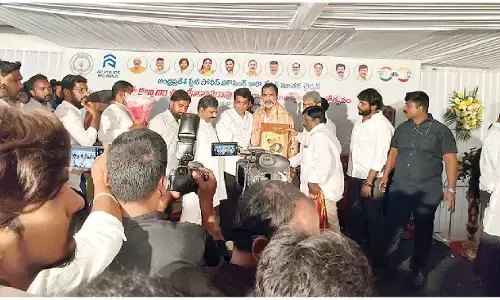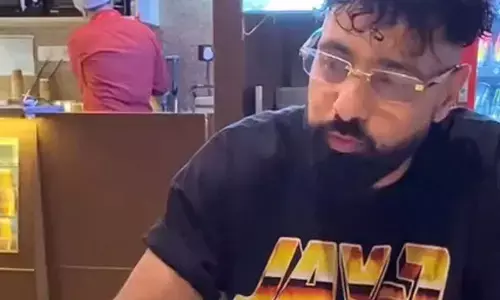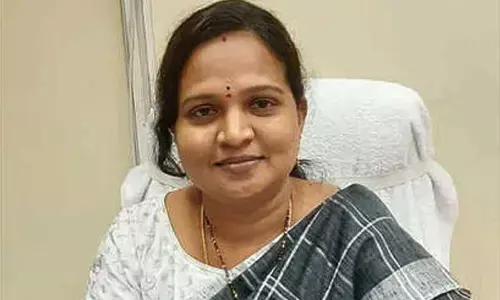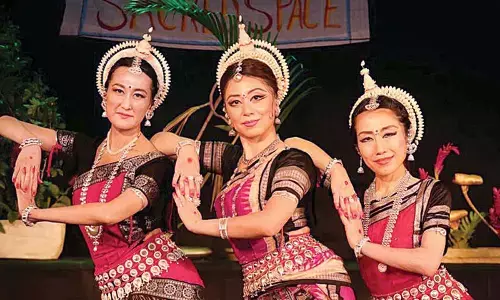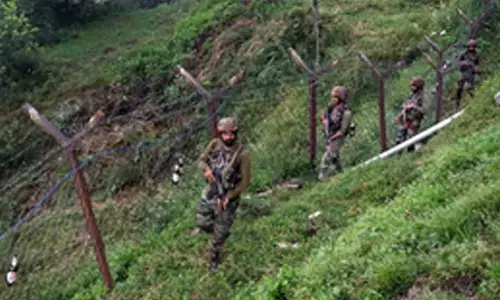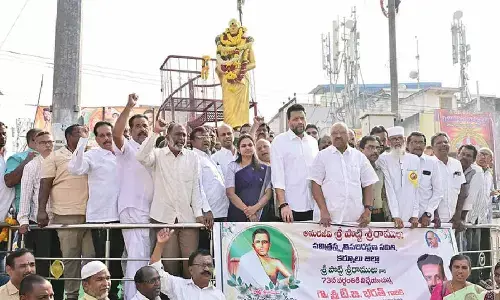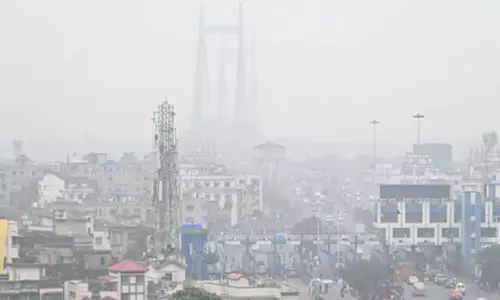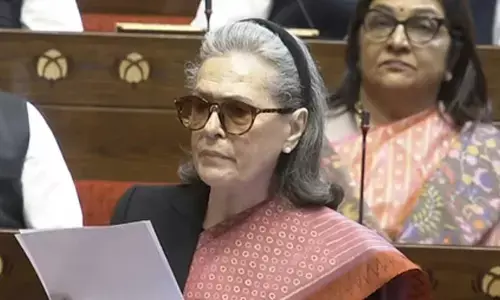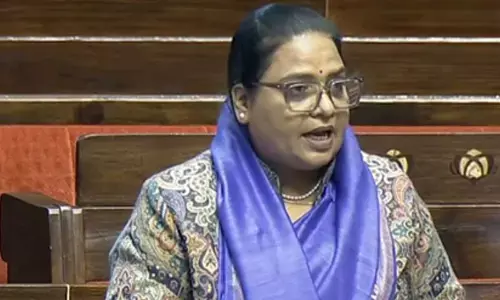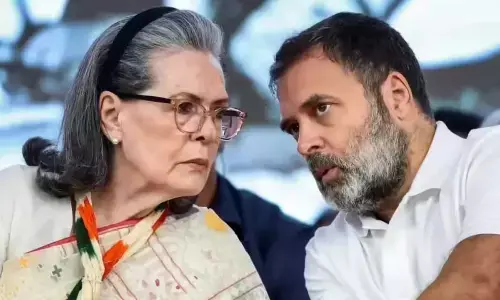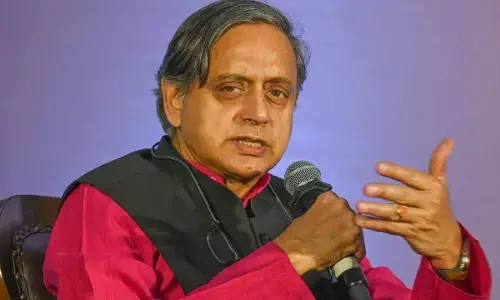'Just look at a picture of Ranil': Sri Lanka president gets long-sought win, steep challenges
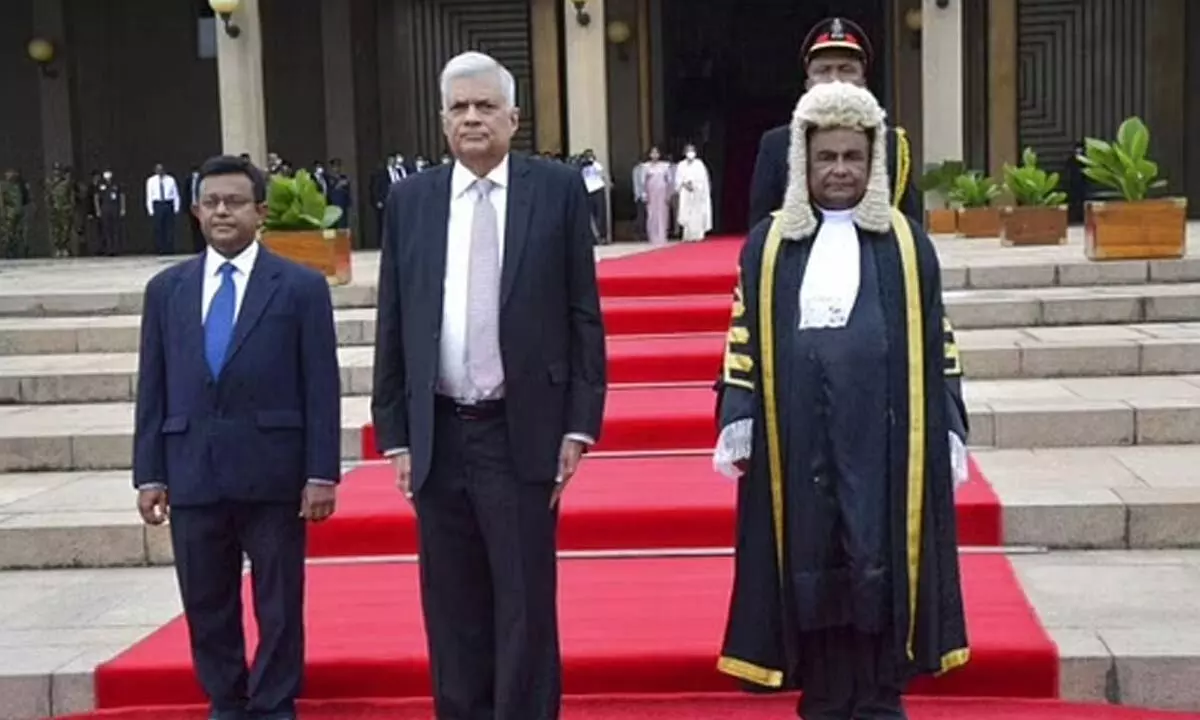
Sri Lanka's newly elected president Ranil Wickremesinghe, flanked by Parliament General Secretary Dhammika Dasanayake, left, and Parliament Speaker Mahinda Yapa Abeywardana. (Photo | AP)
He has moved quickly to consolidate his position since lawmakers elected him this week to finish the term of his predecessor, ousted President Gotabaya Rajapaksa.
COLOMBO: Sri Lanka's six-time prime minister President Ranil Wickremesinghe had long aspired to the pinnacle of power, enduring setback after setback but always managing to recover from seemingly impossible defeats.
He has moved quickly to consolidate his position since lawmakers elected him this week to finish the term of his predecessor, ousted President Gotabaya Rajapaksa.
In the wee hours Friday, army troops and police forcefully cleared the capital's main protest site of demonstrators who had occupied it for months, angry over the country's economic collapse.
On Friday, he appointed a classmate and ally of Rajapaksa, Dinesh Gunawardena, to be his prime minister and partner in rescuing the country from its predicament.
The question is whether they can muster the political heft and public support to get the job done.
Even his critics respect Wickremesinghe for his perseverance.
"If you are broken down and think you can't get what you want just look at a picture of Ranil Wickremesinghe," said lawmaker Udaya Gammanpila, who supported Wickremesinghe's main rival in the presidential vote.
Wickremesinghe is a divisive figure, unpopular among Sri Lankans fed up with shortages of food, fuel and medicine.
Last week, protesters burned his private residence to the ground.
He's as well qualified as anyone could be after nearly a half-century in politics, but it's unclear that the wiles that kept him head of his party for most of that time will suffice to overcome a tide of public antagonism.
Few view Wickremesinghe as a real change from the government that was toppled earlier this month when Rajapaksa fled the country as angry crowds stormed his office.
Born into a wealthy, politically active family whose fortune was made in timber and the media, Wickremesinghe trained as a lawyer and was elected to Parliament for the first time exactly 45 years before he took the oath of office Thursday.
In coming days, he is expected to make a major policy speech laying out plans for fixing Sri Lanka's dire economic, humanitarian and political crisis.
Speaking just after he was pronounced the winner of Wednesday's secret ballot in the parliament, Wickremesinghe urged fellow lawmakers to unite in saving the nation.
"People are not expecting the old politics from us, they expect us to work together," he told Parliament.
Meanwhile, out on the streets, protesters were chanting, "Ranil, Go Home!" Over the years, Wickremesinghe has moved in and out of the prime minister's office as his United National Party gained and lost power.
But he coveted the presidency, where the real power lies, running for office twice: in 1999 and 2005.
In 2020, Wickremesinghe's party splintered and suffered a humiliating defeat in national elections.
He became its sole representative in the parliament, appointed rather than elected to his seat based on the proportion of votes his party took in the vote.
Detractors argued he lacks any mandate.
In May, Rajapaksa turned to Wickremesinghe to replace his brother Mahinda Rajapaksa as prime minister after Mahinda was forced to quit.
The hope was to restore Sri Lanka's international credibility after it stopped making payments on its $51 billion in foreign debt when its foreign reserves dwindled perilously low, and Wickremesinghe has been leading negotiations with the International Monetary Fund on a bailout.
But critics accuse him of protecting members of the Rajapaksa family, who are widely blamed for leading the nation into ruin, from allegations of corruption and other wrongdoing.
Rajapaksa's resignation led to Wickremesinghe becoming acting president, in addition to being prime minister and finance minister.
His assurances that he would restore order and severely punish protesters who had attacked politicians' homes during the unrest won him support from dozens of lawmakers loyal to Rajapaksa.
He cannot afford to seem soft on security: Islamic State-inspired terrorist bombings that killed 260 people in 2019 were largely blamed on intelligence failures stemming from fractured communication and friction between Wickremesinghe, then prime minister, and then-president Maithripala Sirisena.
Tourism was devastated.
Then came the pandemic.
During his lengthy career Wickremesinghe has headed various government ministries, as has his new prime minister, Gunawardena.
The latter, whose father Philip Gunawardena helped lead Sri Lanka's fight to gain independence from Britain, earned a business degree in the US and worked in New York before returning to Sri Lanka when his father died.
Wickremesinghe has become the public face of Sri Lanka's crisis, delivering weekly addresses in Parliament, raising taxes and pledging to overhaul a government that increasingly has concentrated power under the presidency - a trend that many believe helped tip the country into its current predicament.
It's unclear if, now that he has gained the long-sought presidency, Wickremesinghe will back reforms to curb its powers.
He has been known to take the initiative at critical moments.
In 2002, he tried to end a yearslong civil war, signing a Norway-brokered peace agreement with rebels who were fighting to create an independent state for the ethnic Tamil minority.
The cease-fire won Wickremesinghe international acclaim, enabling him to salvage an economy on the brink of collapse after Tamil Tiger fighters attacked the island's only international airport and destroyed many aircraft.
But the pact angered Sinhala Buddhist nationalists who saw it as a betrayal, and the cease-fire failed to hold.
Then-President Chandrika Kumaratunga sacked Wickremesinghe and his cabinet and called an election, which his party lost.
Wickremesinghe ran for president the next year, losing to nationalist Mahinda Rajapaksa.
In 2009, Rajapaksa defeated the Tamil Tigers, becoming a national hero in the eyes of the majority Sinhala Buddhists.
During most of the years since then, the Rajapaksa family has dominated Sri Lankan politics, appointing family and friends in key political and administrative positions.
Wickremesinghe tends to keep his private life under wraps.
He is married to Maitree Wickremesinghe, a professor and expert on gender and women's studies.
New government continues to face scrutiny
Meanwhile, Sri Lanka's new government, much dependent on aid to tide over its worst economic crisis, came under fresh pressure from the international community, human rights groups and the Opposition on Saturday as they urged President Ranil Wickremesinghe to immediately order security forces to stop use of force against peaceful protesters.
Sri Lanka's security forces forcibly evicted anti-government protesters camped outside the presidential office in Colombo in a pre-dawn raid on Friday on the order of the crisis-hit island nation's new President Wickremesinghe.
Protesters have been camping outside the presidential office for months, demanding the resignation of former President Gotabaya Rajapaksa, who fled the country on July 13, and Wickremesinghe, a key Rajapaksa ally.
Protesters have blamed Rajapaksa and Wickremesinghe for mismanaging the economy that has left the country's 22 million people struggling to buy fuel, food and basic necessities.
The Opposition has urged newly-appointed Prime Minister Dinesh Gunawardena to summon Parliament on Monday to discuss attacks on peaceful protests by the country's security forces and the current situation in the country.
Two journalists and two lawyers were also attacked by the security forces during crackdown on Friday.
Authorities have also arrested 11 people, including protesters and lawyers.
Leader of the Opposition of Sri Lanka, Sajith Premadasa has already expressed concern over the attack on protesters.
"There is no denying there was excessive use of force and it was uncalled for. Nothing can justify this inhumane act, the law must be followed by all," he tweeted on Friday.
On Saturday, he once again tweeted that the government should ensure that Friday's violence is not repeated.
He also pointed out that the European Union's warning to the Wickremasinghe government rings alarm bells throughout Sri Lanka as GSP+ is most invaluable for the country's exports.
Premadasa's tweet came after the Council of the European Union in a strongly worded statement on Friday said that the 27-member bloc expects the new Government of Sri Lanka to work in full compliance with its GSP+ commitments.
"In the light of reports of unnecessary violence against protestors, the EU stresses the importance of the right to freedom of peaceful assembly and association and condemns the unwarranted use of force against peaceful demonstrators," it said in a strong statement.
The re-introduction in 2017 of preferential access to the European Single Market under the GSP+ scheme has been essential for Sri Lanka's economic development, it pointed out.
"The EU expects the new Government to work in full compliance with its GSP+ commitments," the statement said.
UN Resident Coordinator to Sri Lanka Hanaa Singer-Hamdy has also voiced her concern over the use of force to disperse protestors at Galle Face.
Taking to Twitter, Singer-Hamdy said journalists and human rights defenders have a right to monitor demonstrations and their functions should not be impeded.
She cautioned that actions that stifle protests and the right to peaceful assembly can worsen economic and political instability in Sri Lanka.
Global rights organisation Human Rights Watch said that President Wickremesinghe should immediately order the security forces to cease all unlawful use of force against protesters.
It also demanded the release everyone arbitrarily detained and investigate and appropriately prosecute those responsible for abuses.
South Asia director at Human Rights Watch Meenakshi Ganguly, in a statement said, "Just one day after taking office, President Wickremesinghe oversaw a brutal assault by security forces on peaceful protesters in the heart of Colombo."
"This action sends a dangerous message to the Sri Lankan people that the new government intends to act through brute force rather than the rule of law," she said.
She added that Sri Lanka's international partners should send the message loud and clear that they cannot support an administration that tramples on the rights of its people.
The Human Rights Commission of Sri Lanka also condemned the raid, calling it a "brutal and despicable attack on peaceful protesters" and a "total violation of the fundamental rights of the people."
US and British diplomats in Colombo have also expressed concern.
"We urge restraint by authorities and immediate access to medical attention for those injured," US Ambassador to Sri Lanka, Julie Chung tweeted.
The British High Commissioner to Sri Lanka, Sarah Hulton she was "very concerned" about reports of a clampdown at the protest site.
"We have made clear the importance of the right to peaceful protest," she added.
Sri Lanka needs about USD 5 billion in the next six months to cover basic necessities for its 22 million people, who have been struggling with long queues, worsening shortages and power cuts.
The country is currently holding talks with the IMF and other foreign countries on financial aid to tide over the current economic crisis.








